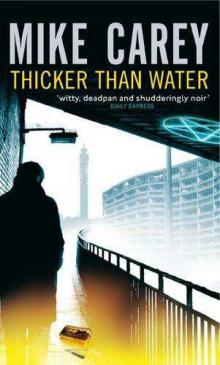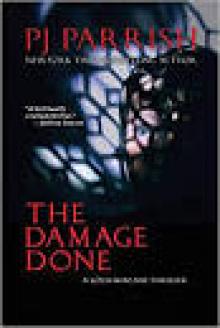- Home
- P J Parrish
South of Hell (Louis Kincaid Mysteries) Page 4
South of Hell (Louis Kincaid Mysteries) Read online
Page 4
There’s a woman behind every case.
Maybe Mel was right. Maybe Shockey had been in love with Jean Brandt, and maybe it was the memory of her and what he didn’t or couldn’t do for her nine years ago that drove his desperation now.
Louis supposed guilt over letting her disappearance go unresolved was a better motivator than trying to hang on to a job, but he still wasn’t sure it was enough to keep him here to help Shockey. What could he do that the Ann Arbor PD or Livingston County Sheriff’s Office couldn’t?
The phone rang.
Louis grabbed it. “Joe?”
“Hey, you got the keg over there?”
“Wrong room, buddy,” Louis said.
He hung up and lay down on the bed, staring at the yellowed ceiling tiles.
Nine years. Shockey had been missing her for nine years. Nine years that must have felt like a lifetime for him.
Louis pulled himself to a sitting position and dug Shockey’s home phone number from his pocket. The paper was damp, the blurred numbers hard to read. The phone rang eight or nine times, and Louis was about to give up when Shockey’s voice cut through the line.
“Yeah?”
“Detective, this is Kincaid. One question. Were you involved with Jean Brandt?”
There was silence on the other end of the line. Then a long exhalation. “Yeah, I was in love with her.”
Louis shut his eyes. “Okay, Detective. I’ll give you one more day to convince me this is worth my time. But I don’t want to hear any more crap about falsifying reports. You got that?”
“Yeah.”
Louis rubbed his brow, nagged by the feeling that he was going to regret this.
“So, what do we do?” Shockey asked. “Where do we start?”
“I want to see this farm. Where is it?”
“It’s about a half-hour west of Ann Arbor, just south of Hell.”
Chapter Five
Louis turned up the collar of his jacket against the rain and stepped closer to the gate of the Brandt farm. A rusty metal sign nailed to a wood post kept him from venturing farther: TRESPASSERS WILL BE SHOT.
He had never spent any time on a farm. He’d been raised in the village of Plymouth, Michigan, for the most part, growing up with all the standard city-issued conveniences. His only experience with farm life had been from movies. Or as seen through the windows of the family Ford during boring Sunday jaunts to the Irish Hills or the long drives up north for the annual vacation.
He remembered thinking at ten years old that farms must be pretty neat places to live. Picking apples right from the tree or jumping from the upper window of a barn into a pile of hay or riding a horse any time you wanted.
Louis stared through the mist at the Brandt farmhouse.
But this place held no such warmth.
It was a crumbling, two-story, red brick house with a steep-pitched, green-shingled roof. The covered wood porch was missing its front steps, railing slats, and most of its gingerbread. The smaller side porch was filled with wet boxes, piles of yellowed newspapers bound with twine, and a small rusted refrigerator—what Louis remembered someone from his childhood calling an icebox. The tall windows, some boarded up, some still shrouded with tattered lace curtains, looked back at him like blank eyes through the overgrown bushes.
Beyond the house, Louis could see three wooden outbuildings, once painted red but now faded to gray, the sides listing, the roofs sunken. In the weeds, four rusted machines lay in a circle around a huge hulking thing with arms and giant gears, like a family of petrified prehistoric monsters.
There was junk everywhere—pitchforks, coils of barbed wire, wagon wheels, pocked metal drums, a faded green tractor with john deere spelled out in rust. And dominating it all, a crumbling cathedral of a barn, its massive doors padlocked.
Louis surveyed the farm. It was hard to believe anyone had lived here just nine years ago. The place had the feel of a land destroyed by war or abandoned to plague.
He heard the door of the car close and turned to see Shockey making his way across the gravel road. He was working his long arms into his dingy raincoat.
Shockey stopped at the gate and stared at the house. He hadn’t said much on the way out here, and Louis had not pushed it, sensing that whatever else there was to this story was not something Shockey talked easily about.
But now that they were here, only a few yards from where Jean Brandt had lived, and maybe died, it was time.
“Did it look like this when you knew her?” Louis asked.
Shockey stuffed his hands into his pockets. Again, he seemed to steel up, and Louis gave him a few seconds to get a grip on his thoughts and memories.
“I drove by here a couple of times right after she disappeared,” Shockey said. “It looked a little better than this but not much.”
“Tough way of life,” Louis said.
“It wasn’t the farming that wore her down,” Shockey said. “She grew up on a farm not that far from here. It was Owen Brandt who made it rough.”
“How’d you meet her?” Louis asked.
“She used to come to the farmer’s market in Ann Arbor and sell potatoes and cukes and things,” Shockey said. “I loved the vine-ripened tomatoes, and I’d browse the market on Sunday mornings and pick up the fresh stuff I couldn’t get from Kroger’s.”
“She came to the market alone?”
“Yeah.” Shockey nodded. “That’s why I noticed her. She was a little thing and used to unload all those baskets by herself, set up her table herself, and load back up again at dark. After watching her a few times, I offered to help.”
“When was this?”
“June 1980.”
“How long after that first meeting did you start an affair?”
Shockey’s jaw ground in thought and maybe a little embarrassment. Again, Louis let him have his time.
“A month,” Shockey said finally. “But it was hard to be together. Brandt kept a tight leash on her and expected her home exactly three hours after sundown. If she was late, she got beat.”
“So how’d you make time?”
“About an hour before dark, if she hadn’t sold all her stuff, I’d buy it, and then we’d do a quick load-up and head for the motel.”
Louis glanced around. The rain had thinned to a fine spray, blurring the land for miles, leaving everything obscured in fog. He wanted to suggest that they sit in the car to finish this conversation, but Shockey seemed more unguarded, as if he felt he was giving Jean Brandt more respect by telling her story out here in this godforsaken place.
“What about when summer ended?” Louis asked. “She wouldn’t have come to market then. Did the affair continue into winter?”
“She could only get away a few times after October,” Shockey said. “She told Owen she had female problems and had to see a specialist in Ann Arbor. Bastard never questioned that, didn’t want to hear anything about her problems, so he let her go.”
“You said you met at motels,” Louis said. “Why not go to your place?”
Shockey sighed. “I was married. I had a kid.”
“So that’s why you didn’t come forward when she disappeared,” Louis said. “You didn’t want your wife to find out.”
Shockey sniffed and pushed his wet hair off his forehead. He was staring at the house again. “That, and I didn’t want to lose my job,” he said. “We had—hell, we still have it, but no one pays much attention to it now—we had a morals clause in our job description. I would’ve been fired.”
“Not to mention you might have been considered a suspect in her disappearance.”
“Yup.”
“Why now?” Louis asked. “Why open this after nine years?”
“Brandt’s been in prison in Ohio for the last seven years. He beat up a woman and threw her out of a car,” Shockey said. “He was paroled a week ago.”
Louis was looking at the farmhouse.
“He almost killed that woman. I know he killed Jean,” Shockey said. “And I am not
going to just stand by and let him kill again.”
“You’ve let this get personal,” Louis said. “I don’t need to tell you that’s not right.”
“I’m older than you,” Shockey said. “And the older you get, the heavier the shit becomes, the shit you didn’t take care of when you were younger. You live under it, thinking it will go away by itself. But it doesn’t.”
Louis was quiet.
“And no matter how much good you do later, it never makes things right.”
“Did you plant the bra in the trunk of the Falcon?” Louis asked.
“Yeah.”
“Who did it belong to?”
“My ex-wife.”
“Whose blood was on it?”
“Mine. I got the idea almost a year ago,” Shockey said. “I knew Jean and I had the same blood type, and I cut myself and bled on it and then left it in my backyard for months trying to make it look old.”
“And the ten grand and my expenses to come here. Where was that money going to come from?”
“My retirement fund.”
“You’re a real piece of work, Detective.”
Shockey faced him, his eyes as empty as the farmhouse’s windows. “I’m not sorry,” he said. “I’d do it again if I thought I could get away with it.”
Louis shook his head. This case was about as cold as they came. Not one shred of evidence or a viable lead.
“Kincaid,” Shockey said, “Owen Brandt abandoned this place like a month after Jean went missing. But he never hired anyone to work this farm for him, and he never put it up for sale. Why do you think that is?”
“You think Brandt buried her out here?” Louis asked.
“I know he did.”
“How big is this place?” Louis asked.
“Sixty acres.”
Louis took a long look around. There was nothing but a cold, lonely grayness as far as he could see and he thought about the possibility that Jean Brandt’s bones were buried out there somewhere, forgotten by everyone but Shockey.
“Are you going to help me?” Shockey asked.
Louis met Shockey’s eyes. But his mind was churning backward a few years. Kneeling in the sand in Florida, digging a hole with his hands to bury a piece of evidence, the only thing he could do to bring justice to a dead girl. He did understand. He understood something else, too: what it was like to love a woman so much you’d do almost anything for her.
“I’ll help you, Detective,” Louis said. “But it will be my way. Are we clear?”
“Yeah,” Shockey said. “We’re clear.”
Chapter Six
The soft knocking came through to his ears like the tap-tap-tap of a hammer. The sound lay tangled in a dream he was having about fixing the air conditioner in his cottage during a hurricane. The dream was a strange kind of paranormal slide show with a parade of characters he hadn’t seen in years. Some jock buddy from high school, an old bearded professor, and a girl who had laughed when he asked for a date.
He opened his eyes with the sense that those same people were there in the motel room with him, but there was no one. Just darkness and a glow of neon against the curtains.
The knock came again.
Had to be some drunk kid looking for a leftover keg. Louis shoved back the blanket, flipped on the bedside lamp, and stumbled to the door. The fluorescent light in the hall blinded him.
“Look, I told you guys—”
Then she came into focus.
Pale face with chiseled cheekbones, thin lips the color of peaches, and a mane of brown hair, not pulled back in her usual ponytail but down around the collar of her rain-beaded black leather jacket. She had a .45 automatic clipped onto her belt.
“Joe.”
She glanced down at his boxer shorts, then raised a brow, amused at his shock to find her at his door at five a.m. Then she put a hand behind his neck to pull him to her for a hard kiss. The kind that had been building during the four-hour drive down from Echo Bay.
He broke away first. “What are you doing here?” he asked.
“Mel called me and told me you were going to stick around here and help this Detective Shockey, so I asked Mike for a few days off and came on down.”
“Mel called you?” He blinked, not yet fully awake.
“Aren’t you glad to see me?” she asked.
“Of course I am. Come here.”
He pulled her to him this time and shut the door. In a clumsy dance of turns and wet kisses, he walked her backward to the bed. She dropped her purse and the envelope she was carrying, and they fell onto the bed.
Her arms circled his neck, and for the next few seconds, they wrapped themselves in each other. She worked his boxers off, but he was having a harder time with her leather jacket and the stubborn snap on her snug jeans.
“Wait, wait,” she said, breathless. “I’ll do it.”
Joe stood up, unclipped the gun, and began to undress. Louis reached down to pick up her purse and the envelope to set them aside. He noticed the writing on the front of the envelope: BRANDT/JEAN AND OWEN.
He looked at Joe. Her back was to him as she peeled off her blouse. “What is this?” he asked.
She glanced over her shoulder. “Oh, just some research I did for you.”
He unclasped the envelope and pulled out the papers. The top sheet was a copy of the missing persons bulletin Ann Arbor PD had sent out nine years ago. Under that were a few newspaper clippings from various southeastern Michigan newspapers that covered the story, then a six-sheet compilation of Owen Brandt’s criminal record.
“How did you even know Brandt’s name?” he asked.
“Mel told me,” she said. “I just thought I’d do you a favor and pull some background.”
“You didn’t have to do this, Joe,” he said. “Shockey’s trying to keep things low-key.”
“I was just trying to save you time,” she said. “I know how hard it is to get the information when you don’t have a badge.”
He looked up at her quickly.
She was standing there in just her bra and panties, all sharp angles, long, lean muscle, and silken hair. The image should have been enough to wash away all thought and the sting of her last comment, but it wasn’t. He turned away slowly and found himself looking at the missing persons bulletin.
It was a standard photocopy, the same thing you’d see hanging in police stations anywhere in the state.
NAME: Jean Lynne Brandt
DATE OF BIRTH: June 6, 1956
HEIGHT: 5'3"
WEIGHT: 102
HAIR: Brown
EYES: Brown
DISTINGUISHING MARKS: None
LAST SEEN WEARING: Blue dress, brown coat.
JEWELRY: Gold wedding band
MISSING SINCE: 12–4–80
There was a blurry picture in the upper right corner. Jean Brandt stared back at him, a heart-shaped face and dark eyes that had a defeated glaze to them. Her hair was covered in a scarf, a few wisps of dark hair framing her forehead.
A solid gray sky filled the small space around her, and even though Louis couldn’t see any buildings, he had the sense that the photo had been taken at the farm.
It was a bad picture to attach to a police bulletin, taken from a distance, unfocused, and sloppily cropped too close to the right side of her head. It probably had been cropped to remove Owen before they copied the bulletins. But Louis was sure the cops hadn’t done the cutting. Maybe Owen had.
And he knew Shockey was right. Owen didn’t give a damn about Jean, alive or dead.
Suddenly, the light went out, and the bed jiggled. Joe’s arms came around him from behind, folding over his chest and beginning an eager caress.
“Come on,” she whispered in his ear. “I just wanted to help. Don’t be mad.”
Her hands slipped down the front of his body, and she started chewing at his shoulder with catlike nibbles. He finally closed his eyes and tossed the folder, turning to take her into his arms.
Chapter Seven
They were standing at the side of the gravel road. The light rain that had started around six that morning was still coming down.
“So you’re just going to leave me here?”
Louis turned to look back at Joe.
“You know you can’t come,” he said.
She pursed her lips. “I’ll wait in the car,” she said.
He heard the thud of the car door as he walked away but didn’t look back. At the padlocked gate he stopped at the trespassers will be shot sign. He thrust the flashlight into a back pocket and scaled the fence, landing in the wet grass on the other side.
He paused to glance back at Joe’s Bronco. He could see her watching him, and he knew she was pissed. As a cop, she couldn’t set foot on this property without a warrant. She knew that. Just as she knew that as a PI, he wasn’t subject to the same strict legal restraints.
He trudged through the high, wet weeds, a small nubby pit in his gut relishing the fact—for once—that she had a badge and he didn’t. Even as his head was telling him what a macho asshole he was for thinking that, even as his dick was telling him how much he had loved being inside her last night, even as his heart was telling him how much he loved her.
He climbed the three steps onto the sagging wood porch and looked back one more time to the car. Hell, she was just trying to help. He would make it up to her tonight with dinner and a good bottle of wine.
There was another padlock on the front door. This one was new. Something else new—a bright orange foreclosure sign—was pasted to the glass of the front door. Louis didn’t remember seeing it the first time he had been here with Shockey, and even out by the gate, the bright orange would have been noticeable.
Louis looked around for options. Some of the windows were boarded up, but a few were still exposed, the rippled old glass filmed with years of dirt.
He walked around the corner of the house, looking out over the land. The sheer size of the rolling land and the overgrown trees and weeds shielded the house from any neighbors. He couldn’t remember even seeing another house on the drive down the lonely and rutted Lethe Creek Road.

 South of Hell (Louis Kincaid Mysteries)
South of Hell (Louis Kincaid Mysteries) Thicker Than Water
Thicker Than Water Dead of Winter
Dead of Winter The Damage Done
The Damage Done South Of Hell lk-9
South Of Hell lk-9 A Killing Rain
A Killing Rain Dead of Winter lk-2
Dead of Winter lk-2 Island of Bones
Island of Bones Paint It Black
Paint It Black An Unquiet Grave (Louis Kincaid Mysteries)
An Unquiet Grave (Louis Kincaid Mysteries) She's Not There
She's Not There